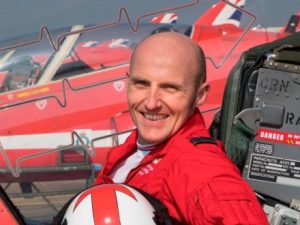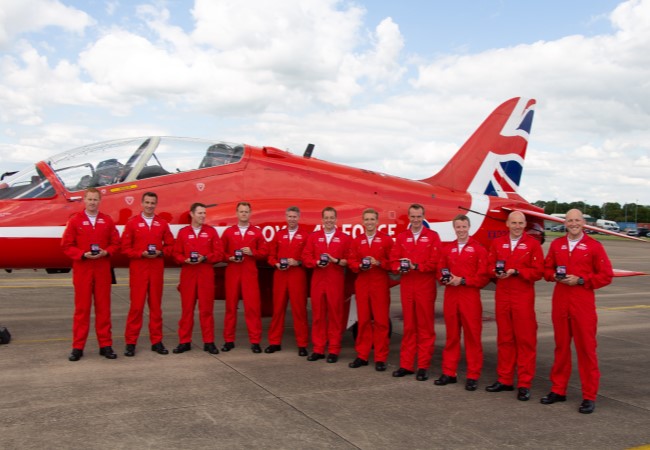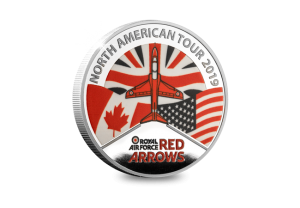As we unveil the brand new Official Red Arrows North American Tour Medal, Red 5 reveals what it takes to become a Red Arrows pilot…

This year, the Red Arrows will embark on a special display season – not only wowing crowds up and down the UK with their dynamic displays, but also painting the skies of North America red, white, and blue during their largest EVER tour of the US and Canada.
And in the run up to the first display over the pond,we wanted to find out all things Red Arrows from the team themselves and Squadron Leader Steve Morris, aka. Red 5, was only too happy to give us an extensive interview. Currently in his first season on his return to the team, Red 5 has told us how to become a Red Arrows pilot and what it’s really like to be part of the world renowned Red Arrows…
How long does it take to prepare the display and train to public display level?
We start our winter training in October, and the team’s development is like building blocks – we don’t display as a 9 straight away. We practice as 3 aircraft together, and then build up to 4, and then 5 – that’s ‘Enid’. Reds 6 through 9, the back 4, will be doing the same. It’s only in February that we’ll put the 2 sections together. So it takes 4 to 5 months before we’re there as a 9, and then another 2 and a bit months of us flying as 9 until we get up to the standard that we would expect to be for the display season.
What happens if one pilot is unable to take part in the display? Do you have reserve pilots?
We would display as an 8. The only caveat is if the Team Leader (Red 1) is unavailable, we can’t display. At some sites, Red 6, 7, 8 and 9 (the back 4) might go and do their second half performance where they do their hide speed passes, but we wouldn’t display as a 9. We practice as an 8 in case anyone is ever missing, and we try and keep it as symmetrical as possible.
‘we get to meet so many extraordinary people’
What’s the best thing about being a Red Arrow?
For me, it’s the ground interactions that you have with people. Earlier this year, when we were operating from Farnborough, we bumped into a 90-year old Dakota pilot who was there to be with his grandson, who is now a fast jet pilot, and he came over to us and had a cup of tea and a chat – we get to meet so many extraordinary people that you would never meet if you weren’t doing this job.
How does the Hawk T1 compare to other fast jets you’ve flown?
It’s a bit like a sports car, but think track-day kit car. There isn’t much on the inside in terms of modern technology, but let’s not forget the jet’s 40 years old! There aren’t things like a moving map, synthetic weapons and head-up display, so if you compare it to the difference between an Aston Martin and a Westfield Kit Car, it’s probably actually more fun flying the Hawk, but there isn’t as much avionics inside the cockpit.

What is the first manoeuvre you learn as a Red Arrows?
You start with what are our ‘basics’ of flying. I know it sounds odd, but as everything is called by the Team Leader, you need to work on everything, so start with left and right bends. Then you progress to do a standard loop, in one of our formation references which is called ‘Battle’, but you’re a little bit further away from the nearest airplane than what the public will see when we display – which is a good thing when you start practicing! Then you’ll move on to more challenging loops and rolls, and then you start to build it up, getting closer adding more airplanes on. Then, finally, you start to change shapes, moving from one formation to another.
What is the Red Arrows selection process like, and how were you selected?
Everyone who’s on the team has to apply to be on the team, so we’re all volunteers. In order to apply you have to have 1500 fast jet hours, you have to have been assessed as ‘above-average’, and you have to have done an operational tour. We get about 30 applicants each year, shortlisted down to about 9 – based on a flying record that we all have as pilots – and then for a week-long period the 9 shortlisted candidates come and spend a week with us, normally out in Cyprus or Greece where they are asked to perform a flying test, which includes loops and rolls. There’s also a formal interview, and a PR interview – where you’re put in front of a camera. But the biggest thing by far is peer assessment – how do you fit in? – not just with the 9 display pilots, but we have 130 engineers and display staff. You need to fit in with everyone. You could be the best pilot in the world but if you’re going to upset the team dynamic slightly, you’re not right for the Red Arrows.
If you are interested…
You can now own the Official Red Arrows North America Tour Medal, the very same that the Red Arrows own themselves! Click here to find out more >>

